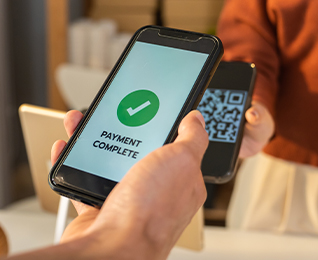Contactless payments are on an upward trajectory owing to the emergence of innovative payment systems, progressive regulatory mandates related to increase in transaction thresholds and transaction fee waiver for merchants and growing consumer preference for greater convenience. The pandemic has further accelerated the trend, with consumers and merchants, both more eager than ever, to adopt touch-free payment methods. India’s, unique, secure, and interoperable real-time Unified Payments Interface (UPI) for retail payments transactions, for instance, shows a clear trend of increasing adoption. The total number of UPI transactions crossed the 3 billion monthly milestone in 2021. Likewise, in several markets – Sri Lanka, Egypt, and Indonesia – lightweight acceptance infrastructure -QR codes- has catalysed growth of contact-free in-store payments.
Acquirers that orient themselves to innovate around these needs and journeys are best positioned to win. Software Point of Sale (Soft POS) represents an incredible opportunity to connect consumer demand for contact free payments with a growing number of merchants seeking an affordable, digital-first approach to service customers.
Soft POS transforms current generation smart phones or tablets into contactless acceptance devices -- simplifying and speeding up the merchant setup process and obviating costs associated with traditional point of sale devices. According to a 2021 study by Juniper Research, the global number of smart phones being used for Soft POS payments will increase from 3.2 million in 2021 to almost 24 million in 2026.
For acquirers, Soft POS enables rapid and cost-efficient expansion of their merchant portfolio through a differentiated services offering. In emerging markets where payment acceptance infrastructure is spotty and underdeveloped, a significant base of the micro and small merchant segment remains underserved due to the fragmented nature of the market and the costs related to acquisition and servicing. Soft POS allows acquirers to bypass costs inherent in the traditional POS acquiring model and empower millions of micro and small merchants to accept digital payments. In India, for instance, there are 5 million POS devices and 200 million smart phone users. Likewise, Africa and Asia Pacific are mobile-first markets. Acquirers can tap into this delta to lower cost and access barriers and achieve economies of scale and.
With the build-out of basic payment acceptance infrastructure, Soft POS also unlocks sizeable opportunities to capture new sources of revenue from "white space" offerings. For instance, the ability to provide access to funds for “new to credit” merchant segments against card swipes on their POS terminals, which will further incentivise merchants to execute more transactions.
For large retailers, Soft POS can improve customer service experience by expediting the checkout process, as customers can simply tap their mobile devices to pay. Retailers can also experiment with a range of in-store formats -- personalised in-aisle services, curb side pick-up, queue busting – significantly elevating the in-store shopper experience.
Additionally in many emerging markets, the consumer journey begins with retailer websites and m-commerce apps but ends with payments in cash on delivery of goods and services. Tap to Phone enables merchants to digitalise these transactions and eliminate cash-handling overheads.
To better monetize their role within the value chain and deepen merchant relationships, acquirers can offer proximate services where they have a play. For each added value service, the merchant receives an additional fee per transaction, thus incentivising digital payments acceptance. Some of the VAS that can be offered includes – consumer financing at the point of sale, analytics, and utility payments.
Selecting the Soft POS Provider
Acquirers are increasingly partnering with technology service providers (TSPs), rather than building capabilities in-house, to improve agility and time to value. Acquirers need to collaborate with TSPs that offer:
- Integrated solution comprising front-end application and payment processing and switching
- Support multiple payment rails – cards, accounts, direct, debit – to optimise acceptance costs
- Offer parametrised solution to rapidly launch and adapt new merchant propositions in response to market needs
- API-driven architecture for orchestration of expansive partner ecosystems to deliver differentiated offerings
- Automate merchant operations, including onboarding, risk monitoring, clearing and settlement, and dispute management
- Accommodate high workloads and cost-efficiently process large volumes of transactions
FSS POS Solution
FSS offers a complete solution to merchants for POS acquiring and processing.
The Soft POS app resident on the merchant’s device enables merchants to collect payment by simply passing the customer’s contactless card over their phones, automatically processing the payment through FSS application. The Soft POS app is device agnostic and is certified for PIN on Glass entry as well as certified by Visa, MasterCard and Rupay card schemes.
The FSS system is designed for scale and can process large volumes of small value payments that will be unlocked with the growth in the acceptance network. The processing system is device agnostic, supports a range of payment acceptance modes (cards, QR, wallets), and offers direct connectivity to interchanges.
FSS lowers operating costs through automated operations. This includes payments integration, connectivity to the card and other payment rails, merchant lifecycle management including clearing and settlement dispute management, risk and fraud detection, terminal security certification and compliance. Acquirers can also monetise large sets of transactional data by sharing transactions trends and industry performance benchmarks.






